Commercial Law Assignment: Gratuitous Promises and Debt Reduction
VerifiedAdded on 2023/06/13
|5
|1192
|110
Case Study
AI Summary
This case study delves into the legal implications of gratuitous promises in the context of debt reduction within commercial law, primarily focusing on the enforceability of agreements where a creditor promises to accept a lower value of debt. It examines the established rule from Pinnel v Cole, which states that courts generally do not enforce such agreements without additional consideration. The analysis extends to exceptions and developments in law, including scenarios involving third-party payments, compositions of creditors, and the application of promissory estoppel, referencing cases like Foakes v Beer, Williams v Roffey Bros, Hirachand Punamchand v Temple, and Collier v P & MJ Wright (Holdings) Ltd. The study concludes by emphasizing the potential for a defense based on promissory estoppel, contingent on proving reliance and resultant loss, while also highlighting the counter-arguments Emma could use. This assignment solution is available on Desklib, a platform offering a wide range of academic resources for students.
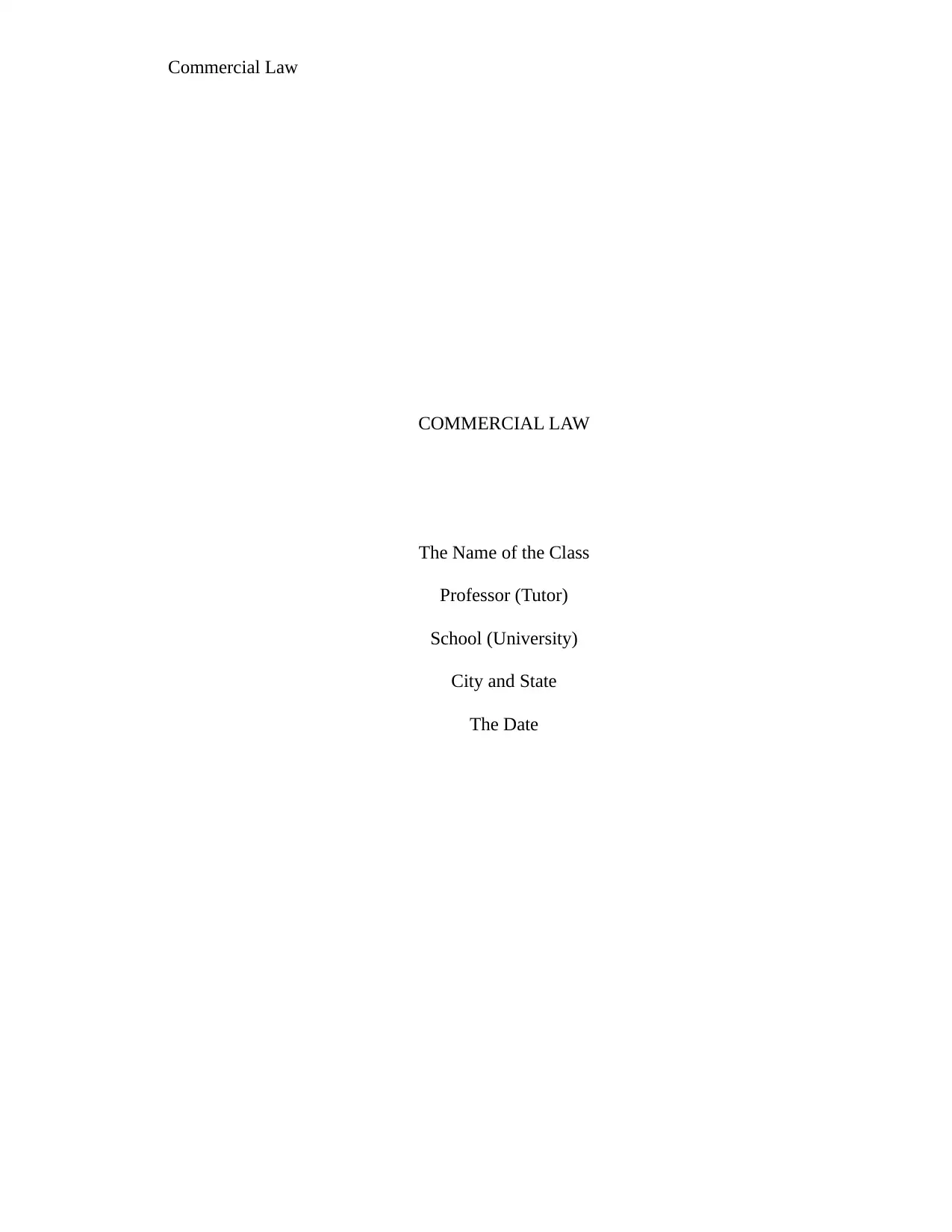
Commercial Law
COMMERCIAL LAW
The Name of the Class
Professor (Tutor)
School (University)
City and State
The Date
COMMERCIAL LAW
The Name of the Class
Professor (Tutor)
School (University)
City and State
The Date
Paraphrase This Document
Need a fresh take? Get an instant paraphrase of this document with our AI Paraphraser
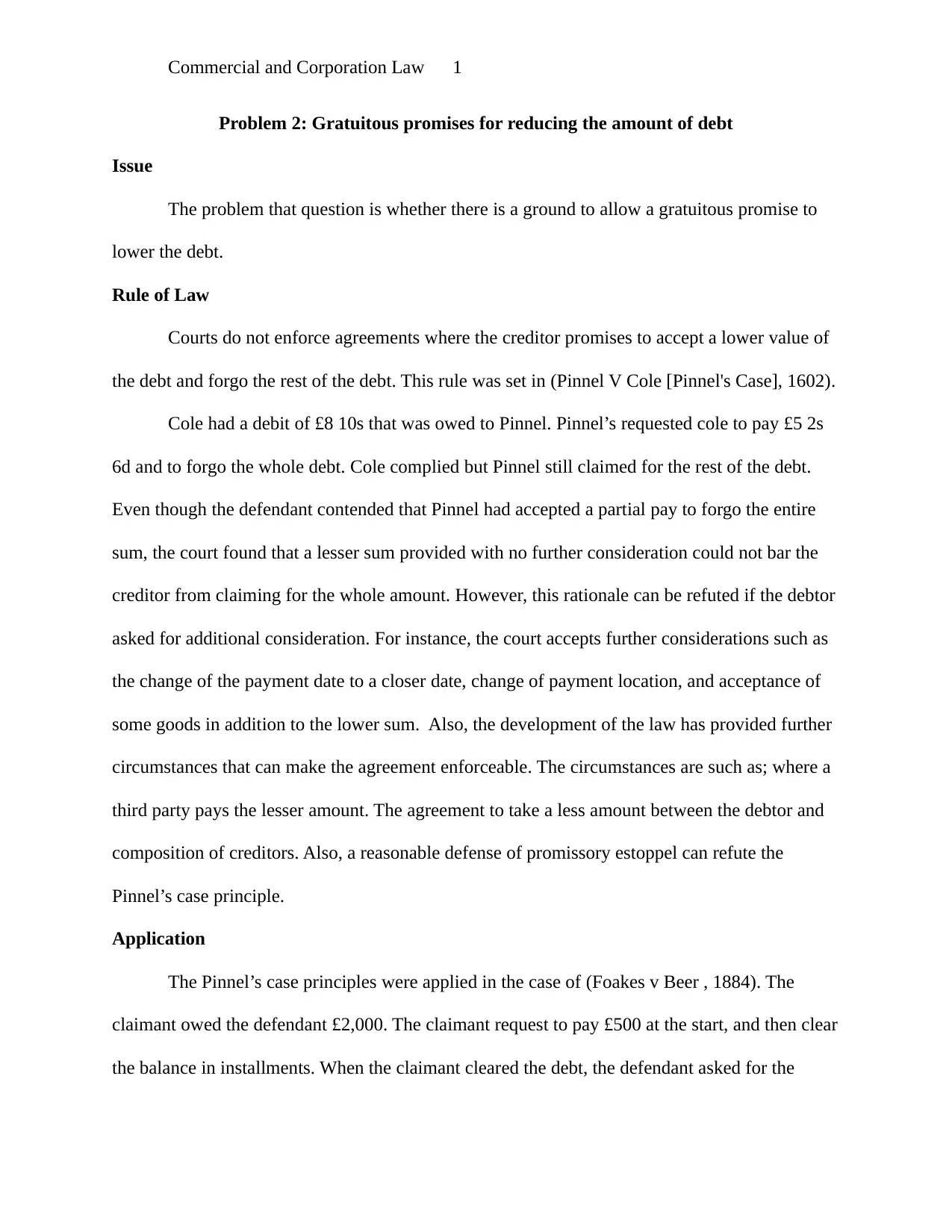
Commercial and Corporation Law 1
Problem 2: Gratuitous promises for reducing the amount of debt
Issue
The problem that question is whether there is a ground to allow a gratuitous promise to
lower the debt.
Rule of Law
Courts do not enforce agreements where the creditor promises to accept a lower value of
the debt and forgo the rest of the debt. This rule was set in (Pinnel V Cole [Pinnel's Case], 1602).
Cole had a debit of £8 10s that was owed to Pinnel. Pinnel’s requested cole to pay £5 2s
6d and to forgo the whole debt. Cole complied but Pinnel still claimed for the rest of the debt.
Even though the defendant contended that Pinnel had accepted a partial pay to forgo the entire
sum, the court found that a lesser sum provided with no further consideration could not bar the
creditor from claiming for the whole amount. However, this rationale can be refuted if the debtor
asked for additional consideration. For instance, the court accepts further considerations such as
the change of the payment date to a closer date, change of payment location, and acceptance of
some goods in addition to the lower sum. Also, the development of the law has provided further
circumstances that can make the agreement enforceable. The circumstances are such as; where a
third party pays the lesser amount. The agreement to take a less amount between the debtor and
composition of creditors. Also, a reasonable defense of promissory estoppel can refute the
Pinnel’s case principle.
Application
The Pinnel’s case principles were applied in the case of (Foakes v Beer , 1884). The
claimant owed the defendant £2,000. The claimant request to pay £500 at the start, and then clear
the balance in installments. When the claimant cleared the debt, the defendant asked for the
Problem 2: Gratuitous promises for reducing the amount of debt
Issue
The problem that question is whether there is a ground to allow a gratuitous promise to
lower the debt.
Rule of Law
Courts do not enforce agreements where the creditor promises to accept a lower value of
the debt and forgo the rest of the debt. This rule was set in (Pinnel V Cole [Pinnel's Case], 1602).
Cole had a debit of £8 10s that was owed to Pinnel. Pinnel’s requested cole to pay £5 2s
6d and to forgo the whole debt. Cole complied but Pinnel still claimed for the rest of the debt.
Even though the defendant contended that Pinnel had accepted a partial pay to forgo the entire
sum, the court found that a lesser sum provided with no further consideration could not bar the
creditor from claiming for the whole amount. However, this rationale can be refuted if the debtor
asked for additional consideration. For instance, the court accepts further considerations such as
the change of the payment date to a closer date, change of payment location, and acceptance of
some goods in addition to the lower sum. Also, the development of the law has provided further
circumstances that can make the agreement enforceable. The circumstances are such as; where a
third party pays the lesser amount. The agreement to take a less amount between the debtor and
composition of creditors. Also, a reasonable defense of promissory estoppel can refute the
Pinnel’s case principle.
Application
The Pinnel’s case principles were applied in the case of (Foakes v Beer , 1884). The
claimant owed the defendant £2,000. The claimant request to pay £500 at the start, and then clear
the balance in installments. When the claimant cleared the debt, the defendant asked for the
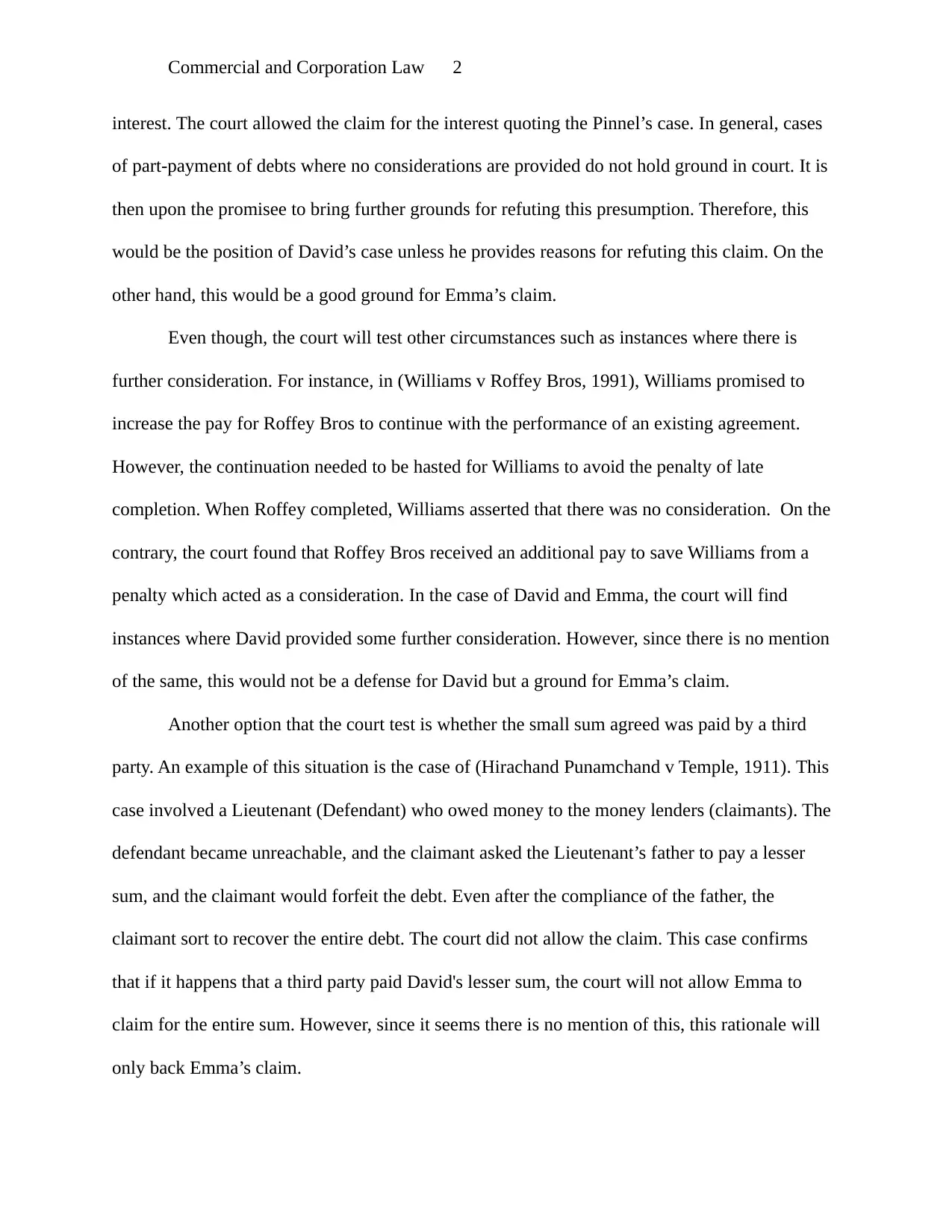
Commercial and Corporation Law 2
interest. The court allowed the claim for the interest quoting the Pinnel’s case. In general, cases
of part-payment of debts where no considerations are provided do not hold ground in court. It is
then upon the promisee to bring further grounds for refuting this presumption. Therefore, this
would be the position of David’s case unless he provides reasons for refuting this claim. On the
other hand, this would be a good ground for Emma’s claim.
Even though, the court will test other circumstances such as instances where there is
further consideration. For instance, in (Williams v Roffey Bros, 1991), Williams promised to
increase the pay for Roffey Bros to continue with the performance of an existing agreement.
However, the continuation needed to be hasted for Williams to avoid the penalty of late
completion. When Roffey completed, Williams asserted that there was no consideration. On the
contrary, the court found that Roffey Bros received an additional pay to save Williams from a
penalty which acted as a consideration. In the case of David and Emma, the court will find
instances where David provided some further consideration. However, since there is no mention
of the same, this would not be a defense for David but a ground for Emma’s claim.
Another option that the court test is whether the small sum agreed was paid by a third
party. An example of this situation is the case of (Hirachand Punamchand v Temple, 1911). This
case involved a Lieutenant (Defendant) who owed money to the money lenders (claimants). The
defendant became unreachable, and the claimant asked the Lieutenant’s father to pay a lesser
sum, and the claimant would forfeit the debt. Even after the compliance of the father, the
claimant sort to recover the entire debt. The court did not allow the claim. This case confirms
that if it happens that a third party paid David's lesser sum, the court will not allow Emma to
claim for the entire sum. However, since it seems there is no mention of this, this rationale will
only back Emma’s claim.
interest. The court allowed the claim for the interest quoting the Pinnel’s case. In general, cases
of part-payment of debts where no considerations are provided do not hold ground in court. It is
then upon the promisee to bring further grounds for refuting this presumption. Therefore, this
would be the position of David’s case unless he provides reasons for refuting this claim. On the
other hand, this would be a good ground for Emma’s claim.
Even though, the court will test other circumstances such as instances where there is
further consideration. For instance, in (Williams v Roffey Bros, 1991), Williams promised to
increase the pay for Roffey Bros to continue with the performance of an existing agreement.
However, the continuation needed to be hasted for Williams to avoid the penalty of late
completion. When Roffey completed, Williams asserted that there was no consideration. On the
contrary, the court found that Roffey Bros received an additional pay to save Williams from a
penalty which acted as a consideration. In the case of David and Emma, the court will find
instances where David provided some further consideration. However, since there is no mention
of the same, this would not be a defense for David but a ground for Emma’s claim.
Another option that the court test is whether the small sum agreed was paid by a third
party. An example of this situation is the case of (Hirachand Punamchand v Temple, 1911). This
case involved a Lieutenant (Defendant) who owed money to the money lenders (claimants). The
defendant became unreachable, and the claimant asked the Lieutenant’s father to pay a lesser
sum, and the claimant would forfeit the debt. Even after the compliance of the father, the
claimant sort to recover the entire debt. The court did not allow the claim. This case confirms
that if it happens that a third party paid David's lesser sum, the court will not allow Emma to
claim for the entire sum. However, since it seems there is no mention of this, this rationale will
only back Emma’s claim.
⊘ This is a preview!⊘
Do you want full access?
Subscribe today to unlock all pages.

Trusted by 1+ million students worldwide
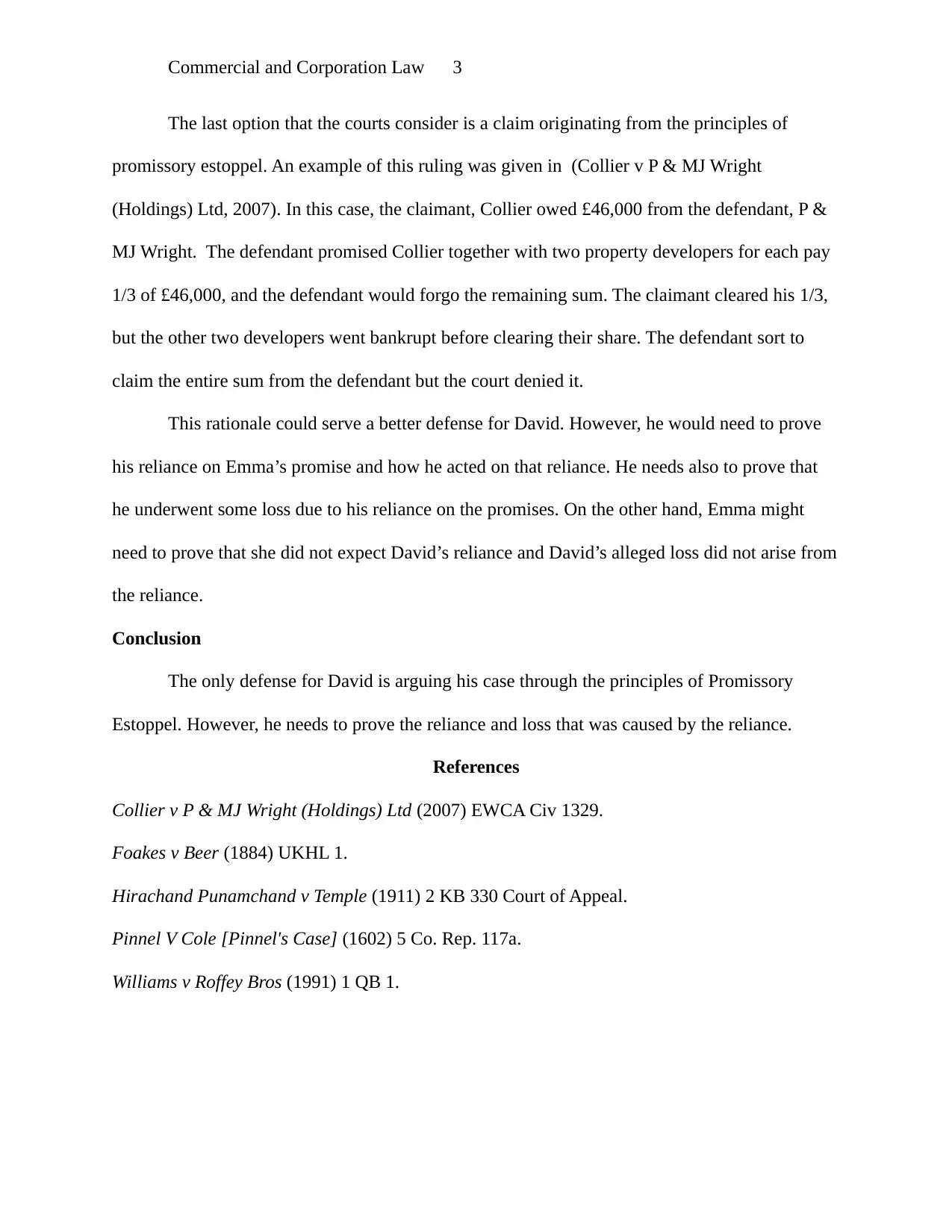
Commercial and Corporation Law 3
The last option that the courts consider is a claim originating from the principles of
promissory estoppel. An example of this ruling was given in (Collier v P & MJ Wright
(Holdings) Ltd, 2007). In this case, the claimant, Collier owed £46,000 from the defendant, P &
MJ Wright. The defendant promised Collier together with two property developers for each pay
1/3 of £46,000, and the defendant would forgo the remaining sum. The claimant cleared his 1/3,
but the other two developers went bankrupt before clearing their share. The defendant sort to
claim the entire sum from the defendant but the court denied it.
This rationale could serve a better defense for David. However, he would need to prove
his reliance on Emma’s promise and how he acted on that reliance. He needs also to prove that
he underwent some loss due to his reliance on the promises. On the other hand, Emma might
need to prove that she did not expect David’s reliance and David’s alleged loss did not arise from
the reliance.
Conclusion
The only defense for David is arguing his case through the principles of Promissory
Estoppel. However, he needs to prove the reliance and loss that was caused by the reliance.
References
Collier v P & MJ Wright (Holdings) Ltd (2007) EWCA Civ 1329.
Foakes v Beer (1884) UKHL 1.
Hirachand Punamchand v Temple (1911) 2 KB 330 Court of Appeal.
Pinnel V Cole [Pinnel's Case] (1602) 5 Co. Rep. 117a.
Williams v Roffey Bros (1991) 1 QB 1.
The last option that the courts consider is a claim originating from the principles of
promissory estoppel. An example of this ruling was given in (Collier v P & MJ Wright
(Holdings) Ltd, 2007). In this case, the claimant, Collier owed £46,000 from the defendant, P &
MJ Wright. The defendant promised Collier together with two property developers for each pay
1/3 of £46,000, and the defendant would forgo the remaining sum. The claimant cleared his 1/3,
but the other two developers went bankrupt before clearing their share. The defendant sort to
claim the entire sum from the defendant but the court denied it.
This rationale could serve a better defense for David. However, he would need to prove
his reliance on Emma’s promise and how he acted on that reliance. He needs also to prove that
he underwent some loss due to his reliance on the promises. On the other hand, Emma might
need to prove that she did not expect David’s reliance and David’s alleged loss did not arise from
the reliance.
Conclusion
The only defense for David is arguing his case through the principles of Promissory
Estoppel. However, he needs to prove the reliance and loss that was caused by the reliance.
References
Collier v P & MJ Wright (Holdings) Ltd (2007) EWCA Civ 1329.
Foakes v Beer (1884) UKHL 1.
Hirachand Punamchand v Temple (1911) 2 KB 330 Court of Appeal.
Pinnel V Cole [Pinnel's Case] (1602) 5 Co. Rep. 117a.
Williams v Roffey Bros (1991) 1 QB 1.
Paraphrase This Document
Need a fresh take? Get an instant paraphrase of this document with our AI Paraphraser
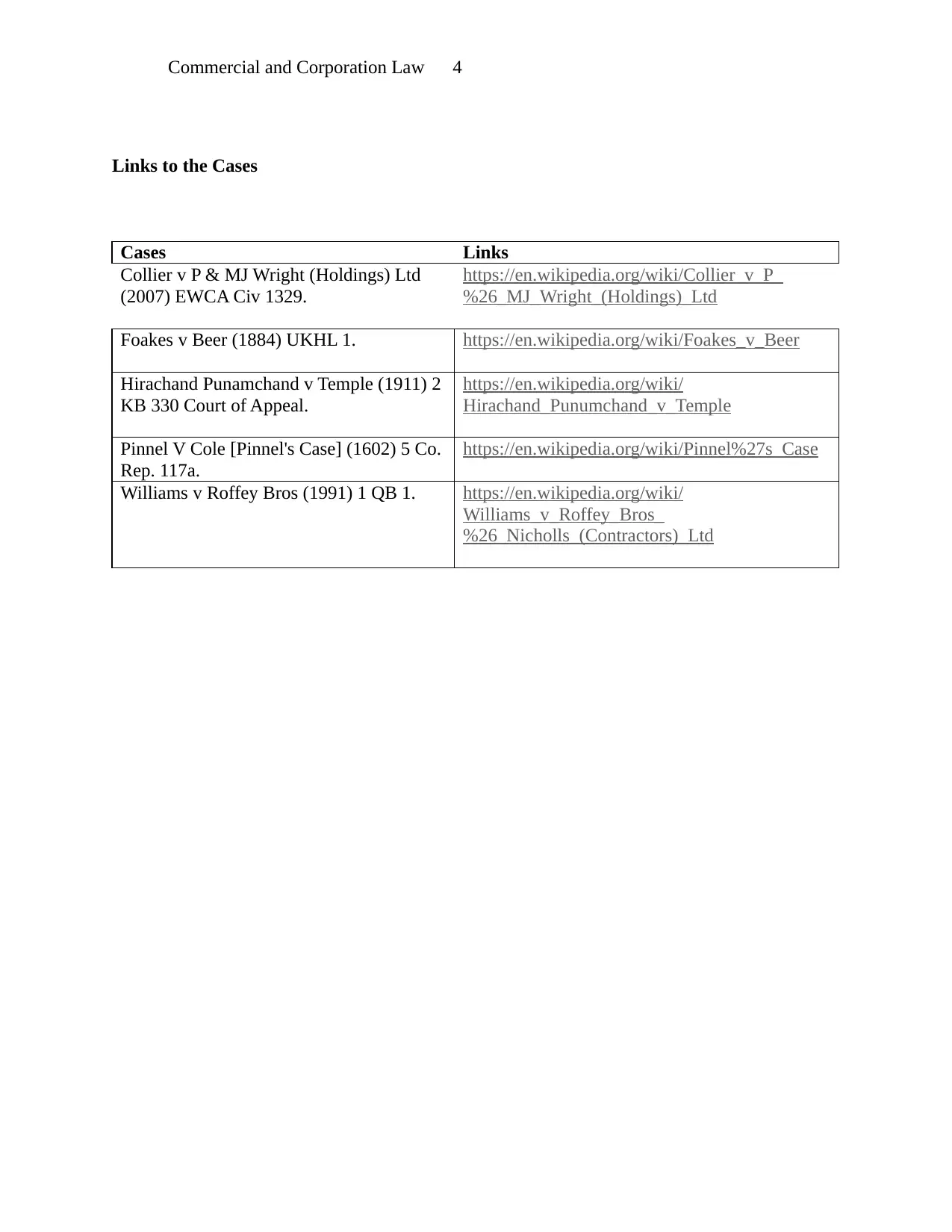
Commercial and Corporation Law 4
Links to the Cases
Cases Links
Collier v P & MJ Wright (Holdings) Ltd
(2007) EWCA Civ 1329.
https://en.wikipedia.org/wiki/Collier_v_P_
%26_MJ_Wright_(Holdings)_Ltd
Foakes v Beer (1884) UKHL 1. https://en.wikipedia.org/wiki/Foakes_v_Beer
Hirachand Punamchand v Temple (1911) 2
KB 330 Court of Appeal.
https://en.wikipedia.org/wiki/
Hirachand_Punumchand_v_Temple
Pinnel V Cole [Pinnel's Case] (1602) 5 Co.
Rep. 117a.
https://en.wikipedia.org/wiki/Pinnel%27s_Case
Williams v Roffey Bros (1991) 1 QB 1. https://en.wikipedia.org/wiki/
Williams_v_Roffey_Bros_
%26_Nicholls_(Contractors)_Ltd
Links to the Cases
Cases Links
Collier v P & MJ Wright (Holdings) Ltd
(2007) EWCA Civ 1329.
https://en.wikipedia.org/wiki/Collier_v_P_
%26_MJ_Wright_(Holdings)_Ltd
Foakes v Beer (1884) UKHL 1. https://en.wikipedia.org/wiki/Foakes_v_Beer
Hirachand Punamchand v Temple (1911) 2
KB 330 Court of Appeal.
https://en.wikipedia.org/wiki/
Hirachand_Punumchand_v_Temple
Pinnel V Cole [Pinnel's Case] (1602) 5 Co.
Rep. 117a.
https://en.wikipedia.org/wiki/Pinnel%27s_Case
Williams v Roffey Bros (1991) 1 QB 1. https://en.wikipedia.org/wiki/
Williams_v_Roffey_Bros_
%26_Nicholls_(Contractors)_Ltd
1 out of 5
Related Documents
Your All-in-One AI-Powered Toolkit for Academic Success.
+13062052269
info@desklib.com
Available 24*7 on WhatsApp / Email
![[object Object]](/_next/static/media/star-bottom.7253800d.svg)
Unlock your academic potential
Copyright © 2020–2026 A2Z Services. All Rights Reserved. Developed and managed by ZUCOL.


![Law of Contract: Case Study Analysis - [University Name] - Semester 1](/_next/image/?url=https%3A%2F%2Fdesklib.com%2Fmedia%2Fimages%2Fhq%2F0404b5624cf445b383d7b5eea9ff8f72.jpg&w=256&q=75)

